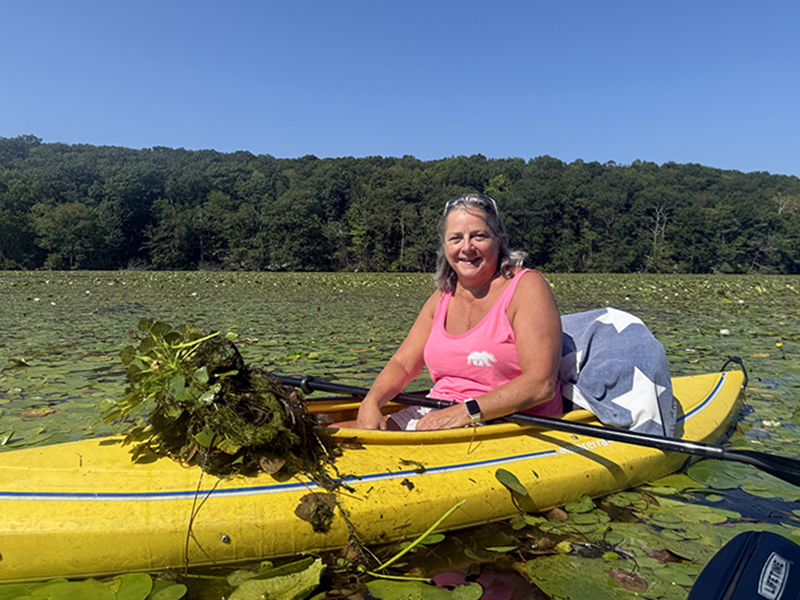
September 09, 2025| Community, Environment, People
By: Donna Macalle-Holly
This summer, hundreds of invasive water chestnut rosettes were pulled from Lake Hopatcong by Water Scouts, volunteers who patrol the shoreline to spot and remove this harmful plant. Water chestnut (Trapa natans) may look like just another floating plant, but it is a critical threat to lakes and rivers. This fast-growing invasive, which can hitchhike on boats, trailers, or even waterfowl, can quickly take over a waterbody if left unchecked. The result? Impeded recreation, damage to fish habitat, and a serious threat to the overall health of Lake Hopatcong.
Throughout the 2025 season, our dedicated Water Scouts located and hand-pulled 163 plants containing 240 rosettes in the Woodport section of Lake Hopatcong near Liffy Island and the Prospect Park Preserve. Many of these plants were removed at an early growth stage, before the nuts, the hard fruits that contain the seed, had fully developed. Each water chestnut seed can produce 15–20 new rosettes, and each rosette can generate up to 20 new seeds. You see how fast things can get out of hand? And the problem can persist for years: while most seeds germinate within two years, some remain viable for more than a decade. By removing plants before seeds are fully formed or while the nuts are still attached, we prevent future plants from entering the lake’s sediment and spreading over the long term.
These removal numbers represent a dramatic increase compared to 2024, when just 23 plants with 34 rosettes were pulled from the same area. The sharp rise highlights the critical importance of early detection and consistent removal efforts to keep water chestnut populations in check.
In addition to our own efforts, we work closely with scientific partners to monitor the lake. During a recent Submerged Aquatic Vegetation (SAV) survey conducted by Princeton Hydro and funded by the New Jersey Highlands Council through Jefferson Township, water chestnut was also discovered heading into the Jefferson Canals near Espanong Bridge. While we, as a nonprofit, are not eligible for Highlands Council funding, we collaborate with local municipalities that are, giving us access to survey results and helping us target our water chestnut removal efforts where they’re needed most.
With water chestnut showing up in new areas, we need more Water Scouts than ever, especially those who paddle in the Jefferson Canal section or near the Espanong Bridge. If you own a kayak and enjoy paddling, you can play a vital role in protecting our lake. Scouts choose one or more of the twenty-two designated zones along Lake Hopatcong’s forty-five miles of shoreline to monitor. When plants are found, they are hand-pulled and reported to us. We provide training, and no prior experience is needed.
The New Jersey Aquatic Invasive Species Management Plan (NJAISMP) was developed with state agencies, environmental stakeholders, and public input to unite existing initiatives, share resources, and centralize data on AIS. Building on this framework, the New Jersey Department of Environmental Protection (NJDEP) launched a new AIS Reporting Form to improve early detection and rapid response. This tool allows anyone to report sightings and upload photos to assist NJDEP’s Fish & Wildlife Division with tracking and control. We now report all of our water chestnut findings through this tool, which strengthens eradication efforts and helps protect New Jersey’s waterbodies.
With invasive water chestnut populations showing signs of growth in 2025, the efforts of our Water Scouts and the support of the lake community are more important than ever. Together, we can protect New Jersey’s largest lake from the ecological and recreational impacts of invasive species.

September 12, 2025
Environment

September 12, 2025
Education, Environment

September 11, 2025
Community, Events, Fundraising, Recreation